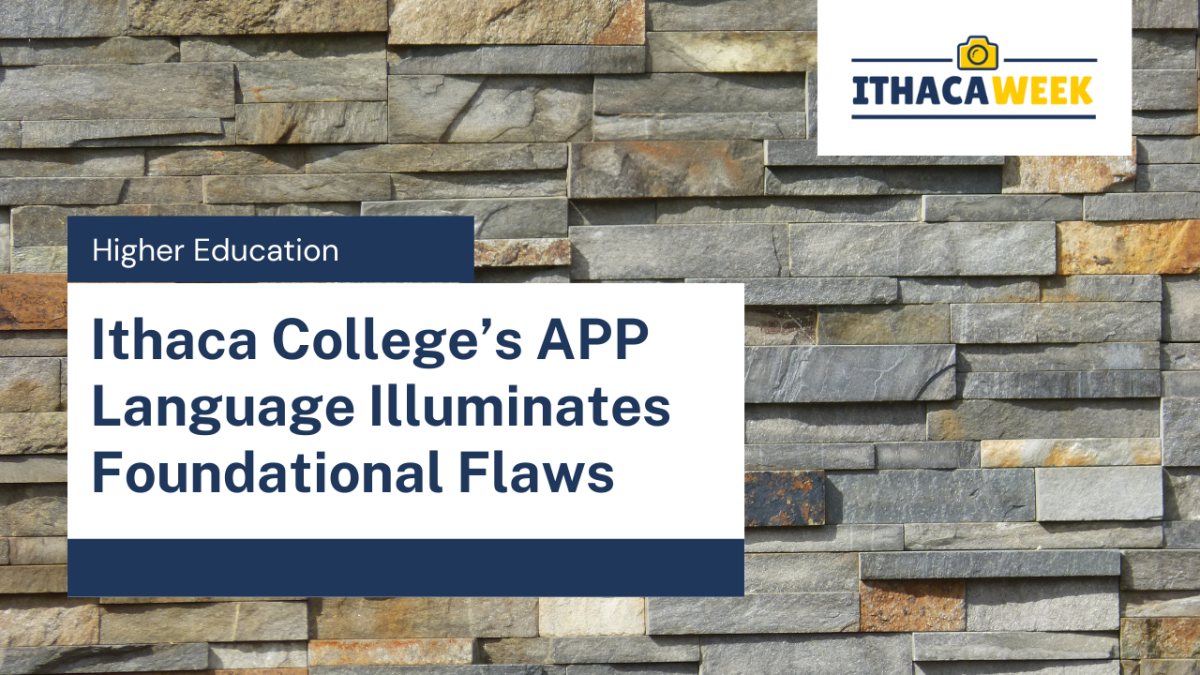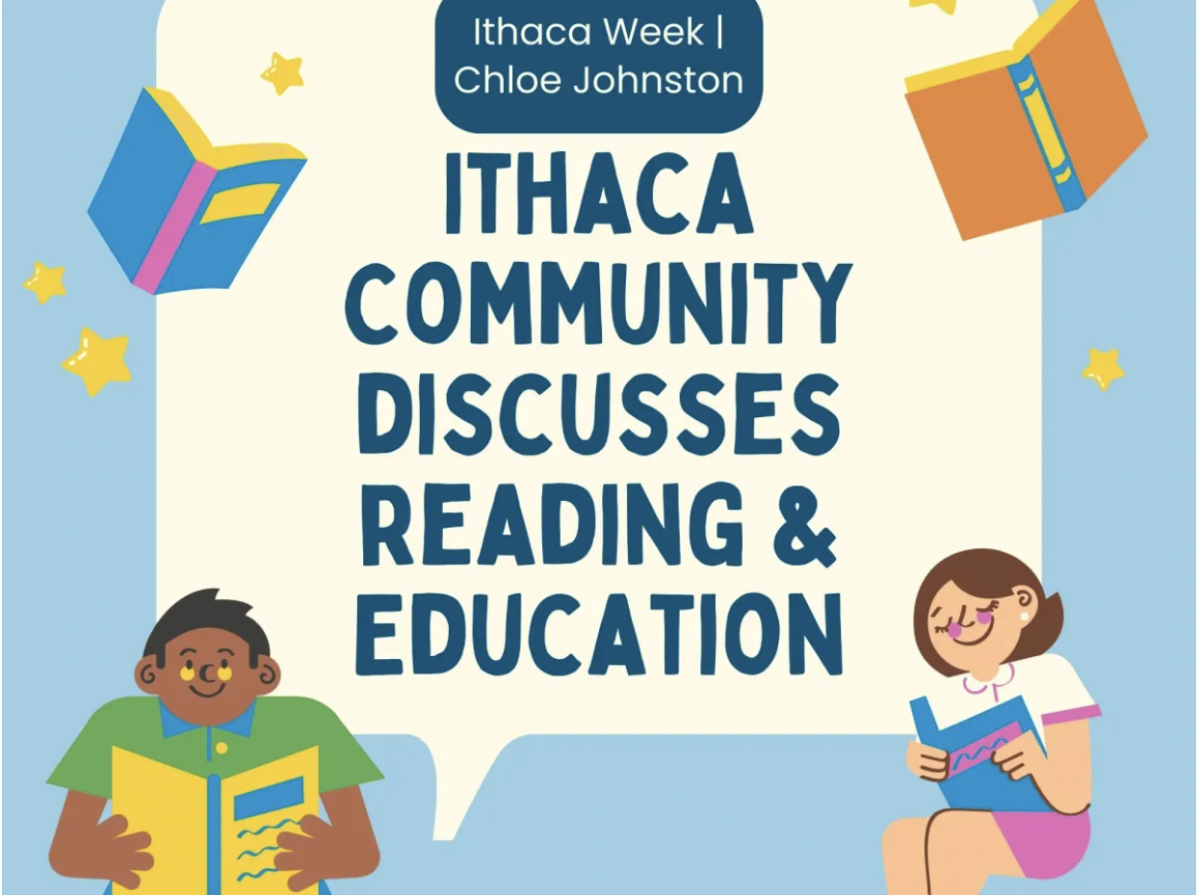“Support,” “community” and “together” were just some of the words that appeared in Ithaca College’s official statements regarding the Academic Program Prioritization (APP) process, which entered its second phase earlier this month.
Community members have criticized the Senior Leadership Team (SLT)— the College’s administrative body—for its linguistic appropriation of institutional values. Members of the Open the Books Coalition, Ithaca College’s alliance of faculty, staff, students and alumni, argue that the administration has employed language that misrepresents the true social cost of the APP, and creates a reality that differs from the lived experiences of stakeholders.
Open the Books organizers Julia Machlin, a senior studying English and Sociology, and Chris Griswold, who is a recent Ithaca College graduate, probed the SLT’s front-facing communications and concluded that the College’s rhetoric is rooted in textual guidelines that neglect principles of shared governance. Their individual research projects analyzed the language that the administration has used to describe and defend the APP process. They collectively analyzed the language of what they call “reactionary documents,” or public addresses made by the SLT, and found that these documents included rhetoric that invoked institutional values.
“The same words are being used over and over again — ‘support, community, together’ — and in my mind, and in the mind of other campuses, that is not what’s happening at IC, we are not brought more together by these decisions,” Machlin said. “Our campus community isn’t any stronger—it’s exactly the opposite”
Technocracy ≠ Shared Governance
The initial phase of the APP process resulted in the elimination of 116 full-time-equivalent faculty positions—not to mention pre-APP staff reductions. The Ithacan, Ithaca College’s student-run newspaper, has dedicated swathes of coverage to the College’s “downsizing” plan. In January 2021, it reported that the implementation of the APP process led to “low morale among faculty.” Additionally, some students have voiced concerns about the impact that downsizing will have on certain academic programs.
The administration asserts that it has engaged in shared governance throughout the APP process, but many in the campus community—especially those involved in Open the Books—have scrutinized APP proceedings, citing the College’s lack of financial transparency and its reluctance to include stakeholders’ input in the “Shape of the College” plan. The SLT has claimed that it incorporated feedback from members of the Ithaca College community. Yet, stakeholders have a different view—they say that initiatives like Collado’s Open Office Hours and faculty-focused Town Halls have been fruitless.
“Department chairs and program directors have been asked to justify their program’s value to the institution,” Open the Books wrote in its Fall 2020 Open Letter to the administration. “This is not faculty feedback; this is pitting us against each other to fight for scarce resources.”
Moreover, multiple departments have sent letters to the SLT in protest of the APP process, with some arguing that the College’s downsizing plan “does not seem to align with IC’s identity or values.”

A Fundamental Disconnect
“Ithaca College is nowhere near a situation of financial exigency, right, so this is not an existential crisis for Ithaca,” American Association for University Professors (AAUP) New York Conference President Dr. Mary Rose Kubal told Ithaca Week.
“I would really push the administration to work with the faculty and students to set up a better process for shared governance.”
Ithaca College Director of Public Relations Dave Maley defended the APP process. He said that downsizing is necessary to ensure the long-term fiscal health of the institution, and that the College cannot use its endowment to balance the budget; Ithaca College’s budget deficit for fiscal year 2021 is an estimated $24.5 million.
“The College is using a data-driven process to make these decisions,” Maley said. “There’s no hidden money that the College has available to cover budget deficits.”
Maley said that the College has been listening to stakeholders’ concerns about the APP process.
“The College is incorporating feedback, but ultimately the administration has to make the final decisions,” he said, adding that the Academic Program Prioritization Implementation Committee (APPIC) executed cuts in accordance with the Faculty Handbook.
Machlin, Griswold and others have stated that there is a disconnect between the administration’s language and its actions.
“Because the school has this ability to create its own reality through texts and through language… they can completely discount the first-hand experience of the workers and put forward something completely different,” Griswold said. “There’s a splitting, there’s a bifurcation of the consciousness; there’s the workers’ consciousness… and then there’s the consciousness of the institution.”
‘Foundational Flaws’
Griswold explained that foundational texts like the Faculty Handbook and Ithaca College Policy Manual are structured in a way that allows the College’s leadership to ensure the continuation of privileged hierarchies among faculty and bypass shared governance. In other words, the administration is not obligated to incorporate the recommendations of stakeholders into organizational decision-making as a direct result of foundational flaws.
“The structure of Ithaca College, informed by these foundational texts, needs to be challenged as part of the wider fight to eliminate profit-driven models of education and government across the United States and the world,” Griswold said.
“These heads of the institution are just that, they’re figureheads,” he continued. “It’s not necessarily about President Shirley Collado or… Provost Cornish or anybody else—it’s about the foundational texts that exist in this institution.”
Yet, the SLT has attested that the current size of the College is not sustainable.
“So the difficult but necessary steps are being taken to align our academic offerings with student interest and institutional need. That means determining which programs should be consolidated, eliminated, or reorganized—but also which will be recommended for growth,” Maley told The Ithaca Voice in November 2020. “In accord with the principles of shared governance, the administration has taken a collaborative approach throughout this data-driven process, engaging the faculty and incorporating their feedback,” Maley continued.
Ithaca College is among many other higher education institutions facing a power imbalance. According to Dr. Kubal, the College should focus on establishing a more robust form of shared governance—one that is democratic and expounded upon in Ithaca College’s foundational texts.

Ithaca College is among many other higher education institutions facing a power imbalance.
“So what’s happening in Ithaca is certainly not unique,” she said. “Hopefully, going forward, there’s going to be more of an intention to really establish much more vibrant, true and processes of shared governance that give faculty and even perhaps students some sort of voice.”













